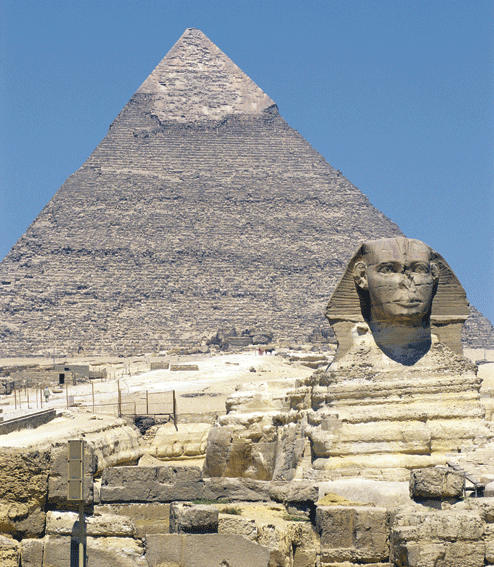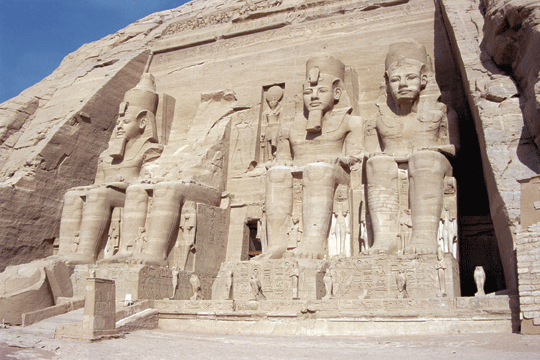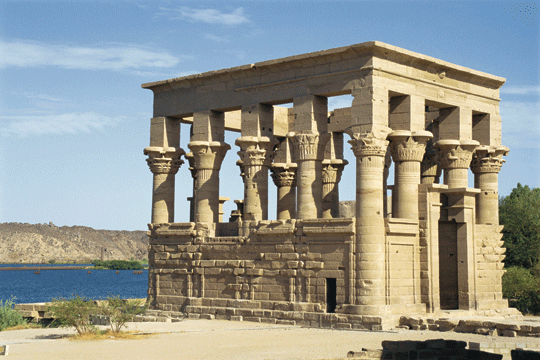
![]() Travel and Adventure
Travel and Adventure

Egypt
Can Egypt Copyright the Pyramids?
If they get their way, Egyptian officials will make it illegal to produce exact replicas or sell images of the Pyramids and other recognizable antiquities in the country, though such regulations are unlikely to be enforced internationally, some legal experts say.
By: Steven Stanek *
Under the proposed law, manufacturers and retailers worldwide would have to obtain special permission -- and in some cases pay fees -- to Egypt to sell products relating to such prized icons as the Giza Pyramids, the Sphinx, and the mask of Tutankhamun.
Some 120 antiquities would be protected under the new law, Zahi Hawass, secretary general of Egypt’s Supreme Council of Antiquities, tells National Geographic News.
Hawass, a National Geographic Society explorer-in-residence, has championed a push to reclaim Egyptian artifacts scattered around the world. (The National Geographic Society owns National Geographic News.)
The law holds that no exact-scale replica can be made: For instance, if an object is two inches (five centimeters) tall, a product of the same dimensions cannot be made without permission. But a three-inch (six-centimeter) replica would be acceptable, Hawass says.
Lawyers who drafted the bill also says they plan to seek royalties from those who use images of antiquities commercially in photography, television, and movies -- but not those images used for educational purposes.
Funds generated by the proposed law would go toward the preservation of historic sites, Hawass says.
“We want to protect Egyptian antiquities. We want to protect our values. This is the most important thing,” he says.
Hawass and his legal advisers singled out countries such as China and the United States, where they say some companies and museums have made millions in the sale of replicas and images of Egyptian ancient objects.
But the bill will not target the Luxor Hotel and Casino in Las Vegas, Nev., which boasts a high-tech, pyramid-shaped structure modeled after the Egyptian pyramids.
“The Luxor pyramid is good for me. This is publicity for free,” says Ashraf El Ashmawi, legal consultant to the antiquities council and author of the new legislation. “It tells the whole world to come to Egypt and see the original.”
El Ashmawi also acknowledged the difficulties of a global copyright.
“If you have a small shop and your trade is very limited, I will not take money from you,” he says. “But if you are a big company, like some of these Chinese companies that make a lot of money from the replicas of antiquities ... according to the law, I can take the fees.”
If passed, the bill could take effect in Egypt as early as the summer.
The legislation, which has been approved by Egypt’s prime minister and is currently before the Egyptian Parliament, has drawn criticism from legal experts outside of Egypt, who say such laws violate international copyright conventions and are unlikely to be enforced.
Egypt and the U.S., for example, are both parties to international treaties such as the Berne Convention for the Protection of Literary and Artistic Works, which essentially guarantees that an author of an artistic work from a member country is awarded the same rights that other member countries allow their own nationals.
In this case, however, experts say that the Egyptian legislation would not fit within U.S. and European laws, meaning they could not be enforced abroad.
In most Western countries, such laws generally protect copyrighted property for a specific amount of time -- usually 95 years -- before the property enters the public domain.
For buildings and statues built by ancient civilizations, experts say the rights would have expired millennia ago.
“The proposed Egyptian law seems out of place under traditional copyright concepts ... it appears to rob rather than fill the public domain,” says Mark Sableman, a partner at the St. Louis, Missouri-based law firm Thompson Coburn LLP and an intellectual property law expert.
“Since no U.S. citizen could have a perpetual right to protect something with no public domain ever being there, it’s hard for me to see how the U.S. would recognize that right from Egypt based (on) the Berne Convention.”
U.S. law also allows artists and photographers to create and sell representations of structures in the public view, which would make it hard to ban the sale of images of structures such as the Giza Pyramids and the Sphinx.
William Patry, author of the Patry Copyright Blog and former copyright counsel to the U.S. House of Representatives, also cast doubt on Egypt’s ability to impose its unique laws on foreign soil.
“You can do it within your own borders if your own laws permit you to do it,” Patry says of copyrighting property thousands of years old. “But it’s pretty unlikely that it’s going to be enforced in other countries. Copyright is a pretty territorial thing.
“The other problem is that there is so much access to this stuff, it could be someone who has never even been to Egypt (who copies it),” Patry adds. “We still have access to images on the Web from other people.”
Still, El Ashmawi, the Egyptian lawyer, says his country could enforce the law in other countries through diplomatic pressure, or by barring those who violate the law from entering Egypt or selling their goods there.
The legislation also contains provisions that stiffen penalties for those caught smuggling, stealing, or destroying antiquities -- the first revision of such laws since 1983.
In recent years Egypt has been involved in several high-profile cases involving stolen antiquities, including the 2004 recovery of granite reliefs from the Temple of Behbeit el-Hagar in Gharbia, which turned up on the block at Christie’s auction house in New York City.
Christie’s later withdrew the items from their auction catalog and returned them to Egypt.
The maximum penalty for smuggling would be increased from the current 15 years to possible life imprisonment, including a $90,000 fine, according to El Ashmawi. Those who damage or destroy antiquities could face up to five years in prison and a penalty of $18,000.
El Ashmawi added that offenders who help Egyptian authorities retrieve illegally trafficked goods or who turn in their partners will receive shorter sentences or be released.
New provisions will also stop foreign archaeological expeditions from taking some of their finds out of Egypt. Under current laws, foreign archaeologists are allowed to transport 10 percent of their discoveries back home, according to Hawass.
“Our antiquities are not for sale. They are not for the taking,” Hawass says.
The law would even create restrictions for locals at major tourism sites. Egyptian vendors selling goods – including those who offer the popular camel and horse rides at the foot of the Giza Pyramids – will be forced to remain outside of a 0.6-mile (1-kilometer) buffer zone.
“The tourists will have a pyramid view that is more peaceful,” El Ashmawi says. “It will be a clean area and it will not be crowded as you see it now.”
* Steven Stanek is a regular contributor to National Geographic News.